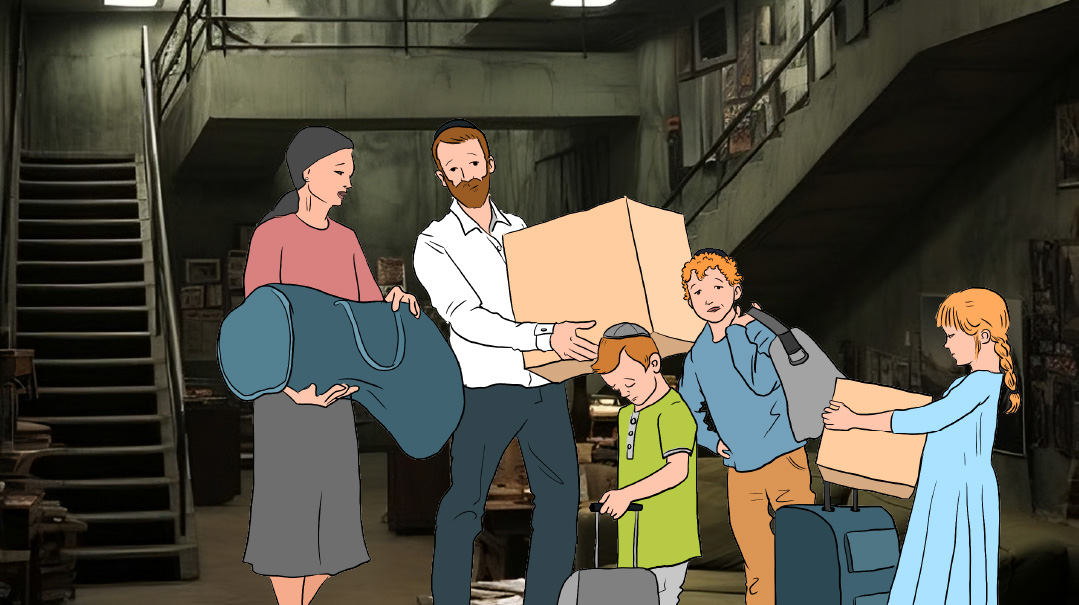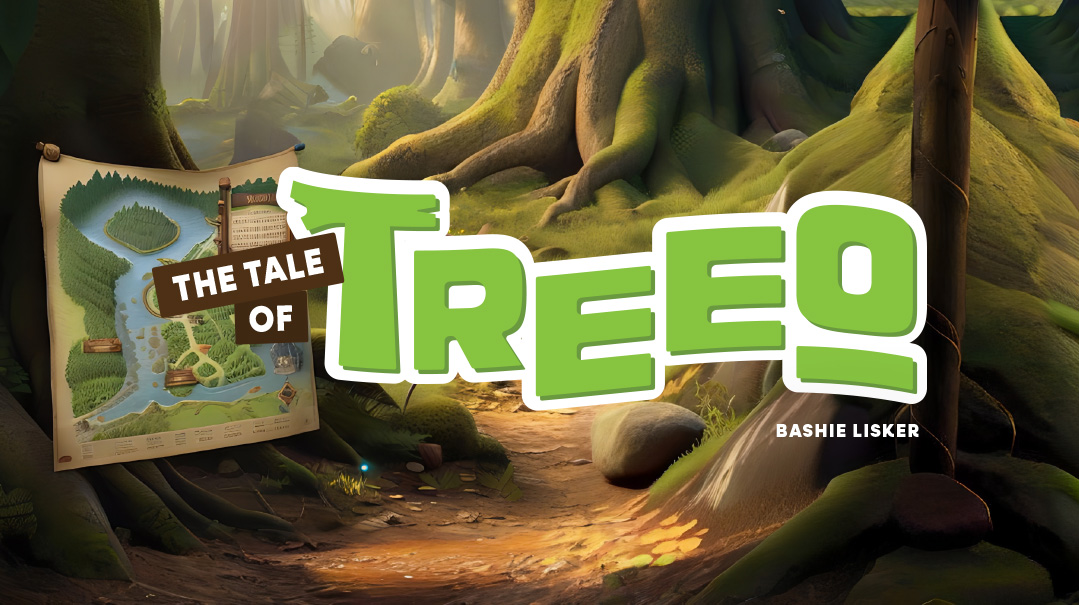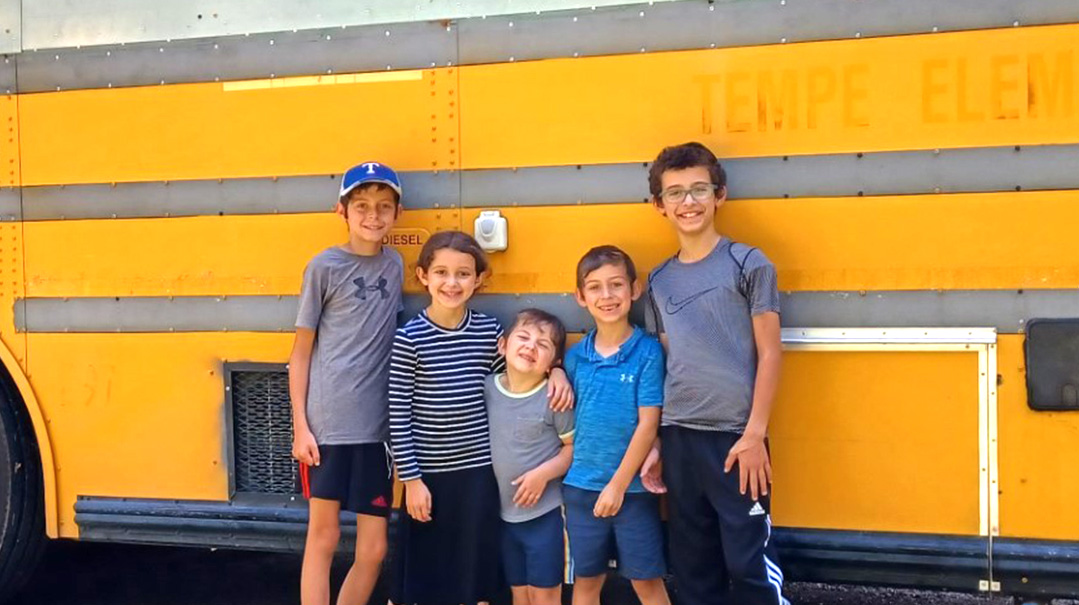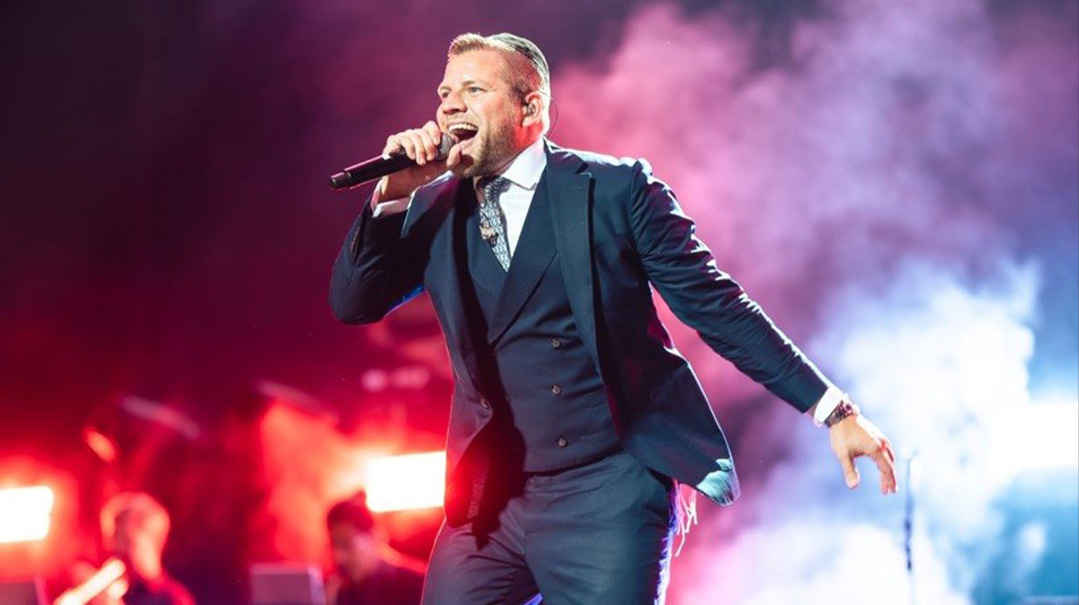Forgotten in the Bunker: A Mesmerizing Tale
| July 18, 2023This was a real, all-too-real, full-scale, total disaster

Illustrations: Esti Saposh
Chapter 1: Disaster
The war in Ukraine was about as far removed from eleven-year-old Yitz Scheiner’s mind as polar bears at the North Pole or giraffes roaming the African plains. Every now and then he heard some fragments of news, but the war had been going on for a while by now, and, well, it was far away. So when the adults started talking worriedly one day, Yitz didn’t pay much attention. But it seemed like his good friend Ruvy did.
“Yitz, are you scared?” Ruvy asked as the boys headed home from school one Thursday night.
“Of what?”
“You know… Putin. The war.”
“The war? Putin?” Yitz gave Ruvy a funny look. “What are you talking about?”
Ruvy huffed, annoyed. “Hello, earth to Yitz. You know, Vladimir Putin? The president of Russia? The guy who took over Ukraine and wants to conquer the world?”
Yitz stopped walking and stared at his friend. “Ruvy, that’s like a bajillion miles away. Why exactly are you worried?”
Ruvy’s eyebrows drew together. “Whoa, Yitz, you are so out of it. The war’s coming and it’s coming fast. Putin’s charging through Europe and countries are falling by the dozen. And they say the US is next.”
“Bah,” Yitz scoffed, kicking hard at the sidewalk. “You’re just a scaredy-cat. We’ve got a good army and lots of defenses.”
Ruvy shook his head. “Yitz, this is a real threat, everyone’s worried. You’re living in la-la land.”
“I don’t believe you,” Yitz said, waving his hand as if he were swatting away Ruvy’s pessimism. “You’ve always been a chicken.”
Ruvy’s face looked serious as the two boys said goodbye in front of Yitz’s house. He didn’t say anything, and instead gave a weak wave before leaving. As Yitz walked up the path, he had no idea that it would be the last time he’d see his friend.
The house was buzzing with a frightening current. Something was really wrong. His parents were flying around the house, frantically stuffing belongings into suitcases, duffle bags, and old backpacks. Mrs. Scheiner met Yitz at the door and threw a knapsack in his direction. “Pack,” she barked. “The news is breaking; Putin’s invading the US in the next 36 hours. We’re going underground.”
Yitz stared at his mother as his heart began pounding. “W-w-what?” he managed, his voice sounding strange to his ears. His mother spun him around by his shoulders and gave him a little shove toward the stairs. “Go pack!” she said, her voice shrill. “Clothes, some books, your siddur — whatever you can fit.”
Mr. Scheiner rushed past them with another duffle bag. He paused when he noticed Yitz. “Hey, Yitz,” he said softly. “Hopefully this is all just to be safe, and everything will blow over soon. For now, our family and the Weisenbergs and the Adlers have decided that this is the wisest course of action. Listen to Ma, go pack. As much as you can fit.”
A foreboding sensation washed over Yitz. His hands turned icy and thousands of questions roared in his brain but before he could even formulate a single syllable, both his parents had disappeared, desperately rushing to pack whatever they could.
Ruvy might not have been chicken, after all. This was a real, all-too-real, full-scale, total disaster.
Chapter 2: Going Underground
His parents said the bunker was large, as bunkers go, and that they were lucky they weren’t in a damp, dark cave. They said it was because Mr. Adler worked in national security that they had access to a bunker like this one. They said hopefully everything would blow over soon, and everything would go back to normal. They said that just like they’d all gone through Covid and come out all right, they’d go through this scare, too, and that everything would be okay.
They said many nice things and it was a little reassuring to hear, but Yitz wasn’t sure he believed them. The bunker, in his opinion, was awful; underground, stuffy, crowded, and dark. The generator providing the bunker with electricity could only support a small light-bulb in each room, and the room was kind of being lit up by a night-light. Food was simple and there wasn’t much of it; the adults rationed it strictly. It was all food that couldn’t go bad; canned tuna fish, baked beans, crackers, canned corn, peas, and other vegetables. Yitz thought this was a wretched diet and voiced his opinion every few days, but the grownups never got tired of reminding him how lucky they all were to be safe and have food.
Some of Yitz’s siblings had friends in the bunker, but neither the Adlers nor the Weisenbergs had children Yitz’s age. Everyone was younger. After three days, Yitz was bored out of his mind. He craved air, sunlight, a normal meal, and his friends. His body longed for light and space. The cramped, dim, lonely bunker was awful.
At first, the Scheiners were confident that everything would go back to normal… soon. What soon was, no one could tell. But as the days and then weeks went by, the news that reached the bunker was increasingly dismal. War was raging, but at least they were safe, if miserable. Everyone tried to make the best of the situation, but as the weeks turned into months, Yitz grew more and more depressed.
Chapter 3: A New Life
“Can you believe we’ve been here for a full year?” Mr. Scheiner said to Yitz as they gently closed their Gemaras after their daily learning session. Yitz’s eyebrows shot up in surprise, and in the dim light, he could see his father’s exhausted face. “A whole year?” he asked.
“Yes. It was early last summer… right before summer vacation. Remember?”
Yitz remembered. The memories hit him painfully in the chest, so painfully that he almost couldn’t breathe. That last conversation with Ruvy… outside, in the light, the sun, the warmth, the air, the openness of a city block. Yitz looked around their small, dark, and stuffy surroundings and he felt his eyes welling up. A whole year… summer, the Yamim Tovim, Chanukah, Purim, Pesach, Shavuos, and… they were still here. They couldn’t celebrate any of the special times of year properly. The three families living together in the bunker did their best to improvise and do what they could, but compared to their previous lives, that was very little indeed.
A year stretched into two, and then into three. Mr. Adler ventured out of the bunker every few months to retrieve more supplies and food, and each time, everyone waited, trembling and davening until he returned. The news from the outside was grim; Mr. Adler looked more haggard each time he came back. As much as Yitz longed for his old life, it seemed that his new life was here to stay, at least for the foreseeable future. The adults never tired of reminding themselves and each other that at least they were safe.
By the time Yitz was 16, the families had been in the bunker for five years. Now and then they spoke longingly of their past lives. They’d sit in the perpetual dimness and talk about having friends, going to school, going to shul. About a life with relatives and teachers, coworkers and peers. They’d talk about family simchahs and bar mitzvahs and Hachnasos Sifrei Torah. They’d remember food… all different sorts of food, served hot, or cold, or frozen, with so many different kinds and types and variations. They spoke of Yom Tov seudos and pizza and fries and fresh, juicy fruits like watermelon and grapes and crisp green apples. They reminisced about the days when the sun was warm and bright, and a breeze would tickle their cheeks. They inhaled deeply and almost smelled the rich scents of each season: the smoky summer barbecues, the fresh cool breeze of fall, the fragrance of spring, and the sparkling magical white of winter.
As the years rolled by, their memories became increasingly distant. Yitz wondered if it had ever really happened. Had he really been that boy, flying across the baseball diamond, sneakers pounding the ground as he ran? Had he really seen all those things that seemed so distant from their life in the bunker? Had he really once read books about so many different subjects and seen pictures from so many different places? Had he really once eaten such a different variety of foods? It became harder and harder to believe that it had once all been so real.
Chapter 4: A New World
There was now a world inside the bunker, too. A new world. As the outside world and its memories faded ever more, the bunker world developed and even flourished. The families grew, and more babies were born; babies who had never seen the light of a bright, sunny day, felt the feel of prickly grass under their feet, heard leaves rustling in the wind, or smelled chicken soup bubbling on the stove.
Eventually, Yitz matured and reached marriageable age. The Weisenbergs had a daughter three years younger than Yitz, and with mutual agreement all around, Yitz and Batsheva got married in the bunker, the echo of weddings from the Old Life reverberating distantly. The new Scheiner couple settled into married life and less than two years later, Yitz, Batsheva, and the rest of the Bunker World welcomed the first child of a new generation, Tova. How could they not name this child Tova, goodness? They were blessed. They had everything they needed — food, water, and even some light. Plus, they had each other, their families, and most importantly, they were safe. Sometimes Yitz found himself longing for the Old World, but his wife, Batsheva, hardly remembered it at all. She’d been just eight when they’d escaped down into the bunker, and 15 years later, all she had were fuzzy memories.
Chapter 5: A New Generation
As the years rolled by, new voices filled the bunker. Besides the babies born to the first families, another whole new generation of people filled the increasingly crowded, cramped bunker. The babies grew into children and the original bunker children were now adults. Matches were made, weddings were celebrated, and the original grown-ups were aging. Stories from the Old World became the stuff of legends. After Rosh Hashanah davening, when Zeidy Scheiner would describe coming home from shul and partaking of the simanim, the children marveled at the strange-sounding names of foreign foods. Zeidy spoke about tiny bright-red pomegranate seeds, and sticky, sweet brown dates. He said there were also bright orange carrots that were hard and crunchy, unlike the soft, soggy canned ones that everyone in the bunker ate. The stories of Purim from the Old World sounded like enchanting fairy tales, filled with excitement and commotion. However, they had to admit, those stories also held a touch of fear. Here in the bunker, they were warm, and together, fed and happy, secure and content. They couldn’t imagine ever wanting to venture out into the unknown, big wide world on top of them.
Chapter 6: Not One Left
The years continued to pass, the inhabitants of the bunker grew older, and then even older. One by one, the elderly great-grandparents passed away, and after enough time had elapsed, there was no one left that remembered the Old World. No one, that is, but old Zeidy Yitzchak. In his ancient, weak voice, Zeidy Yitzchak would occasionally tell stories about the Old World. He would describe animals and birds, lakes and oceans, trees and flowers, the sun, the moon, and stars. His great-grandchildren tried to listen patiently, but it was so distant, and so, well, unbelievable that they had a hard time understanding. Had such a world ever existed?
Then it was Zeidy Yitzchak’s turn. Just a few days before he’d turn 96, Zeidy Yitzchak passed away, leaving no one to talk about the Old World.
His children sometimes told their grandchildren about the wonderful stories they’d heard. They’d sigh and say, “Zeidy would insist that that is the real world, and that we are just here in the meantime.” But as the meantime grew ever longer, it seemed harder and harder to conceive a world that was better than theirs. They didn’t have the concepts with which to grasp the strange words: light, air, space, sun, moon, stars. What could be brighter than the comforting glow of the small bulbs in the bunker? What was the sun like? Was it like three of those little bulbs put together? Wouldn’t that hurt their eyes?
It was hard to long for the Old World. You see, there wasn’t anyone around who could tell them about it or had ever experienced it firsthand — no one knew what it looked like, smelled like, felt like, or what it was really like to live there. As a result, the families in the bunker saw no reason to even want to leave their life underground. Life in the bunker, to them, was undeniably comfortable and satisfying.
Think about It…
Every Tishah B’Av, we sit and mourn the destruction of Hashem’s beautiful home that we lost nearly 2,000 years ago. It’s not only the Beis Hamikdash that we’re missing, but the incredibleness of living a life connected to Hashem with absolute clarity. The truth is, for many of us, it’s hard to fully grasp what life was like with the Beis Hamikdash. We’ve been in our bunker for so long that we can’t even imagine a different reality. But take a minute to picture a time in your life when you felt so uplifted. Whether it was dancing on Simchas Torah or at a Pesach Seder. Just imagine if every day you felt like that. That is what it was like to live in the times of the Beis Hamikdash. And that is what we’re truly missing.
(Originally featured in Mishpacha Jr., Issue 970)
Oops! We could not locate your form.






